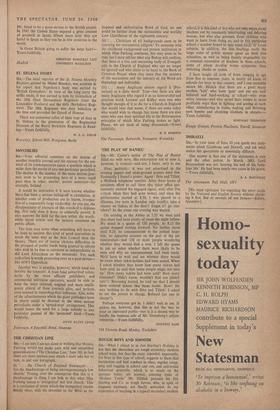SIR, — Your editorial comment on the demise .if another monthly journal
and the reasons for the sur- vival of its contemporaries raises a question which is wider than the merits of any one particular periodical. The decline in the number of the more serious jour- nals seem to be proceeding here at a more rapid pace than in other, smaller, poorer countries—for example, Ireland.
It would be instructive it it were known whether there has been a serious falling-off in circulation, or whether costs of production are to blame, irrespec- tive of a respectably large readership. As you say, the disappearance of journals of this standard is depress- ing. Not only does it leave us culturally poorer, it also narrows the field for the new writer, the worth- while travel article and the incisive comment on public affairs.
The time may come when something will have to be done to succour this kind of good journalism in much the same way as the Arts Council does the theatre. There are of course obvious difficulties in the prospect of public funds being granted to editors who wish to be free to comment as independently as did Lord Altrincham on the monarchy. Yet, such radicalism is worth preserving even as a paid device— like HM's Opposition.
Another way is possible, however, which need not involve the taxpayer. A trust fund subscribed volun- tarily by the more affluent publishers, and commercial television operators, would be able to keep the more talented, original and more intelli- gently critical of these journals alive, and perhaps even succeed in expanding their influence. Also, some of the advertisements which the giant publishers have in plenty could be directed to the more serious periodicals under a 'spread-over' arrangement. This would lessen the need for a large subsidy to any particular journal of the 'protected' kind.—Yours faithfully,
GWYN ILLTYD LEWIS




















 Previous page
Previous page